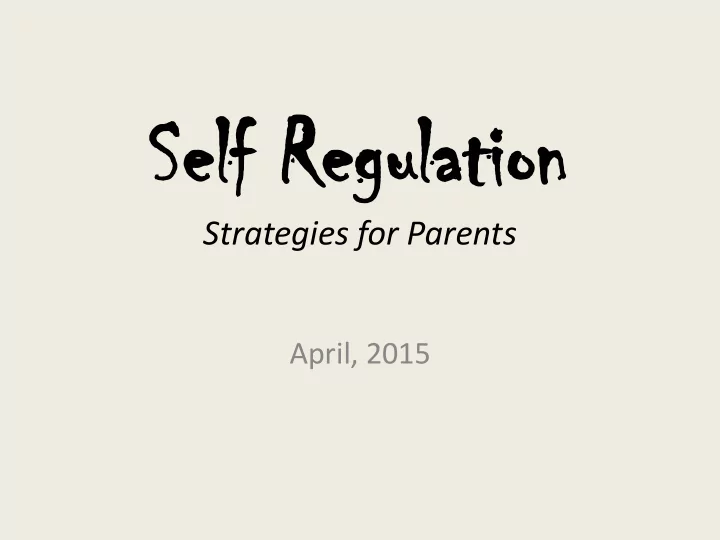

Sel Self f Reg Regula ulation tion Strategies for Parents April, 2015
A case of the…. Ya buts………..
What is Self Regulation? The ability to adapt our physical and emotional energy and out thinking and social skills when we need to. (Hoffman, 2015) It involves: sensory processing, executive functioning, and emotional regulation
3 things to consider • Sensory Processing: hyper sensitive and hypo sensitive • Executive Functioning: cognition, conscious control of thoughts … attention, working memory, self talk, making choices, planning, inhibition • Emotion Regulation: monitor, evaluate, modify Adapted from: Zones of Regulation
Both sides of the coin… • Up Regulation • Down Regulation Self regulation is about changing the energy level. Aim is for being calm and alert.
Understanding Self Regulation The Role of the Brain
• Designed to keep our body in balance • Our body craves homeostasis • The brain supports adaptive functioning • It is hardwired to protect us
Why is this important? Flight, Fight, or Freeze
A Helpful Brain Model http://www.youtube.com/watch?v=DD-lfP1FBFk
Self Regulation: Putting on the Brakes • We need our brain to have the alarm system • Dealing with escalating emotions – Higher level cortical functions – Self-awareness and coping stress • Training our brain – Plasticity allows us to strengthen our brains
Neither comprehension or learning can take place in an atmosphere of anxiety. Rose Kennedy
The Significance of Safe Space To learn students need to feel safe. When students don’t feel safe, the fight or flight center of the brain, the amygdala, fires and incapacitates the hippocampus, the new-learning center of the brain. Students then become survivors vs. learners (Nussbaum, 2012).
School Based Approaches • Calm, Alert, and Learning (Stuart Shanker) • Zones of Regulation (Leah M. Kuypers) Blue, green, yellow, red
Significance of the Parenting Relationship • Provides predictability and routine • Supports a trusting relationship • Models self regulation • Enables self regulation
What does this mean at home? • Structure and predictability Am I allowing the brain to know what it can expect/count on? • Choices for up and down regulation Am I creating options to allow self regulatory attempts? • The impact of mirror neurons What am I contributing to the interaction?
The Marshmallow Test Revisited
…. teach me HOW to calm down don’t just TELL me to…
Understanding the Triad MIND Thoughts/Feelings BRAIN/BODY BEHAVIOR Physiology How we act
Thoughts/Feelings
Helping your child understand emotion • Feelings charades • Books • Games • Coaching/Naming emotions • Engage them around both positive and negative emotions • Set them up for success
Cognitive Reframing Adapted from: D. Bilsker, M. Gilbert, D. Worling & E. J. Garland Situation Thoughts Realistic Thoughts Thinking Error What proof do I have? All or Nothing Thinking Overgeneralization Would most people Mental Filter agree with this thought? Disqualifying the positive Jumping to conclusions If not, what would be a Magnification/Minimization more realistic thought? Emotional Reasoning What would I say to a Should statements friend in a similar Labeling and Mislabeling situation? Personalization
Self Compassion Not about judging ourselves positively, but a way of relating to ourselves kindly, embracing ourselves lovingly flaws and all
Impact of Self Compassion on Self Regulation • Particular impact on willpower • Donuts and Dieters: resultant increase in ability to self regulate (Adams &Leary, 2007) • The power of self compassion/forgiveness is demonstrated to prevent relapse : Alcohol Quitting smoking ( more effective than the patch ) Gambling Procrastination
Self Compassion The thing that is really hard, ,and really amazing, is giving up on being perfect and beginning the work of becoming yourself. Anna Quidlen http://www.self-compassion.org/ • Treating yourself as you would a good friend
Sensation/Physiology Manage distress states, relaxation, deep breathing
The Significance of Physical Engagement • Physical contact • Physical activity: using physical activity to moderate energy levels • Sensory need regulation (plasticine, playdoh, stress balls etc.)
Modifying Physiology/Sensation Habituation • A reduction of a person’s physiological response to a repeated specific stimulus • We can change the way we experience a stimulus/stressor/anxiety invoking event by controlled, repeated gradual exposures • Pairing NEGATIVE stimulus with a POSITIVE stimulus to retrain the brain Analogy: cold lake
Strategies: Take up Smoking Just kidding! Why this works: Taking a break physically from place/environment which generates stress Deep breathing Let’s practice…
Modifying Physiology/Sensation: Mindfulness Paying attention to the present… Without judgement Without expectations Without fear Just accept it as it is….
How students feel about it.. http://www.shared- care.ca/vid.aspx?y=kk7IBwuhXWM
Mindfulness • A seated meditation may be easiest OR a body scan • MARC.ucla (Mindfulness Awareness Resource Centre) meditation recordings iTunes U Guided Mindfulness (free audio guided meditations)
Summing it All Up
Are you ready to change the lens? http://www.ted.com/talks/shawn_achor_the_h appy_secret_to_better_work?language=en
The 21 day Challenge Daily: 1. Write down 3 new things you were grateful for that day 2. Journal one positive experience 3. Exercise 4. Meditation 5. One random act of kindness
Resources Websites: Parents for Children's Mental Health Anxiety BC Anxiety BC Parent Toolkit Mind Your Mind Books: Building Emotional Intelligence (Linda Lantieri) Flourish (Dr. Seligman) The Mindful Child (Susan Kaiser Greenland) Brainstorm: The Power and Purpose of the Teenage Brain (Daniel Siegal) The Highly Sensitive Child: Helping Our Children Thrive When the World Overwhelms Them (Elaine Aron)
Questions?
Recommend
More recommend